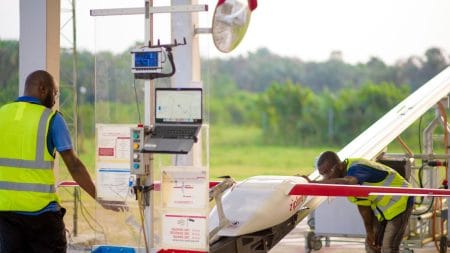Mozambican President Daniel Chapo has announced that the country is leveraging digital systems and artificial intelligence (AI) to strengthen its early warning and disaster preparedness capabilities, as climate-related disasters grow more frequent and severe.
Speaking in Geneva at a high-level panel on Early Warning for All Initiatives and the Role of National Meteorological and Hydrological Services, Chapo said Mozambique is actively digitalising meteorological and hydrological systems and interconnecting regional data platforms to enhance real-time forecasting and response coordination.
“The country is creating automatic mechanisms for collecting and sharing climate data in the region and the continent,” Chapo explained. “This investment aims to build an increasingly interconnected and accessible system where scientific information is transformed into understandable and timely alerts for all citizens.”
AI-powered climate vigilance
Mozambique’s initiative includes the use of AI-driven data processing tools to detect early climate anomalies and predict the path and intensity of extreme weather events such as tropical cyclones and floods. The system will help improve decision-making, giving communities more time to respond and reduce loss of life and property.
The country already benefits from support through the Systematic Observations Financing Facility (SOFF), which is helping modernize Mozambique’s hydrometeorological network and integrate AI models into its forecasting infrastructure.
Funding and inclusivity challenges
Chapo acknowledged that limited climate financing continues to hinder resilience-building efforts. He urged the creation of new public-private partnerships and the mobilization of international funding to scale early warning systems across Africa.
“Every dollar invested in early warning represents a saving of seven dollars in reconstruction—protected lives and empowered communities,” he said. “Universal alert coverage will only be real if it is inclusive and people-centred.”
Mozambique, he added, remains fully committed to the Early Warnings for All initiative and the Paris Agreement, calling on the UN, Climate Funds, and development partners to strengthen both technological and financial support for vulnerable nations.
Rising climate threats
Mozambique has faced escalating climate challenges in recent years. During the 2024–2025 rainy season, the country was struck by tropical cyclones Chido, Dikeledi, and Jude, which battered northern provinces already burdened by humanitarian crises in Cabo Delgado.
Chapo emphasized that the effectiveness of early warning systems “depends on innovation and sustainable investment,” noting that AI and digital infrastructure are key to protecting lives and building climate-resilient societies.






